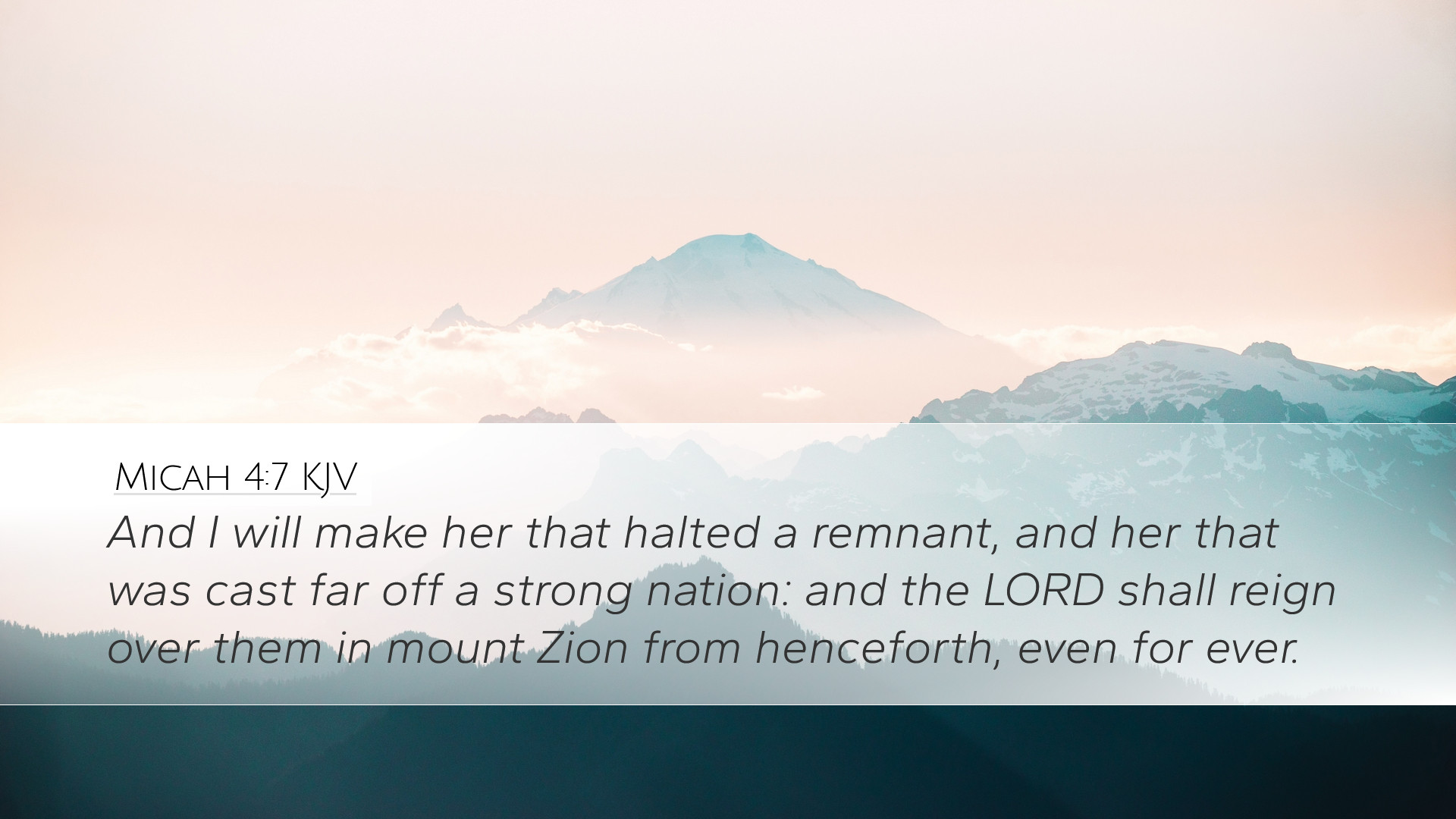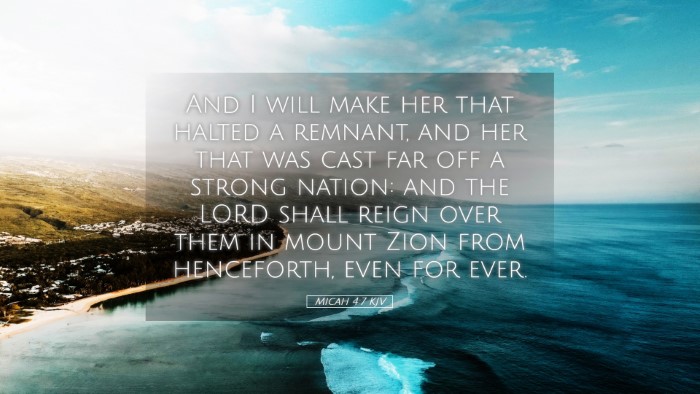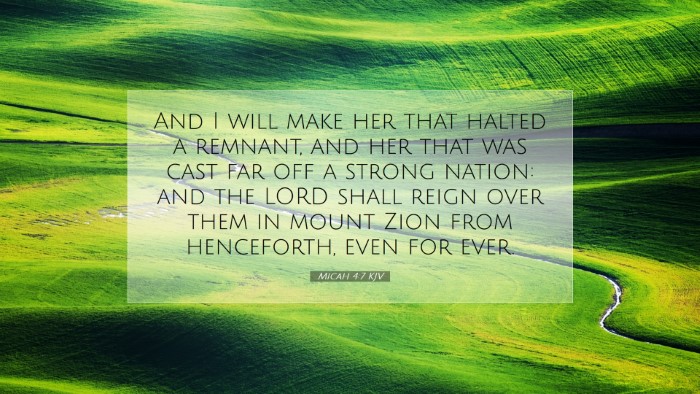Old Testament
Genesis Exodus Leviticus Numbers Deuteronomy Joshua Judges Ruth 1 Samuel 2 Samuel 1 Kings 2 Kings 1 Chronicles 2 Chronicles Ezra Nehemiah Esther Job Psalms Proverbs Ecclesiastes Song of Solomon Isaiah Jeremiah Lamentations Ezekiel Daniel Hosea Joel Amos Obadiah Jonah Micah Nahum Habakkuk Zephaniah Haggai Zechariah MalachiMicah 4:7
Micah 4:7 KJV
And I will make her that halted a remnant, and her that was cast far off a strong nation: and the LORD shall reign over them in mount Zion from henceforth, even for ever.
Micah 4:7 Bible Commentary
Commentary on Micah 4:7
Verse: Micah 4:7 - "And I will make her that halted a remnant, and her that was cast far off a strong nation: and the LORD shall reign over them in mount Zion from henceforth, even for ever."
Introduction
The book of Micah, a prophetic text, provides a transformative vision of hope and restoration. Micah 4:7 encapsulates the promise of God to revive a beleaguered remnant of His people, transforming their despair into a robust nation under His sovereignty. This commentary is designed for pastors, theologians, and scholars, drawing on rich insights from historic public domain commentaries.
Contextual Background
The context of Micah’s prophecy lies in a period of judgment due to Israel's moral and spiritual decay. In the previous chapters, Micah highlights the sins of Judah and Israel, emphasizing their social injustices and idolatry. Yet, amid these declarations of judgment, Micah offers visions of eventual restoration and hope.
Exegesis of Micah 4:7
Micah 4:7, while short, is packed with theological weight and meaning. It begins with "And I will make her that halted a remnant,” indicating that God will take those who have stumbled due to sin and despair and make them a fruitful remnant. This reflects a theme throughout scripture where God uses the weak and the marginalized to accomplish His purposes.
The phrase "and her that was cast far off a strong nation" suggests restoration and return. Here, God’s intention is to gather those who have been exiled or marginalized because of their unfaithfulness. The transformation of this remnant into a “strong nation” indicates a revival of hope and strength among a people who felt they had lost their identity and purpose.
Finally, the declaration, "and the LORD shall reign over them in mount Zion from henceforth, even for ever," signifies divine kingship and sovereignty. The mention of Mount Zion serves as a powerful reminder of God's chosen dwelling place and the significance of His reign. This suggests not just the restoration of Israel but the hope of an eternal kingdom ruled by God Himself.
Theological Insights
Micah 4:7 paints a dramatic picture of redemption. From Matthew Henry’s perspective, it is a reminder of God’s unwavering commitment to His people, despite their unworthiness. Henry elaborates that this verse offers a glimpse into the enduring nature of God's covenant and His grace toward the remnant.
Albert Barnes emphasizes the significance of the term "remnant" throughout scripture as a consistent theme of hope. He notes that God’s actions are often directed toward those who are humble and broken, suggesting that true strength comes from reliance on God rather than human might.
Adam Clarke further reflects on how this restoration reverses the fate of the nation. He explains that the transformation from "halted" to a "strong nation" highlights the paradox of God’s redemptive work, where the last become first and the weak are made strong. This can be seen in a broader messianic context, where Christ ultimately fulfills this role in the spiritual restoration of humanity.
Practical Applications
For the pastor and theologian, Micah 4:7 serves as a powerful reminder of the nature of God's grace and the importance of hope. Here are some practical applications:
- Emphasizing inclusion: The remnant theme highlights God’s call to those marginalized by society. Pastors are encouraged to reach out to those feeling left out or forgotten.
- Preaching restoration: This passage can serve as a powerful text for preaching on God’s ability to restore lives, communities, and nations, emphasizing that no one is beyond His reach.
- Providing hope: In times of despair, believers must be reminded of God’s promises and His faithfulness, as illustrated in the promise of eternal kingship over His people.
- Encouraging reliance on God: Just as God transformed the weak into a strong nation, believers are encouraged to place their trust in God's strength rather than their own.
Conclusion
Micah 4:7 serves as a poignant declaration of hope for a future where God reigns supreme over His people. It embodies the principle of divine restoration, showcasing how God can use the "halted" and "cast far off" to create something new and mighty. This verse reminds scholars and theologians alike that God’s plans transcend human understanding, centering on His profound grace and faithfulness in achieving His divine purposes.


